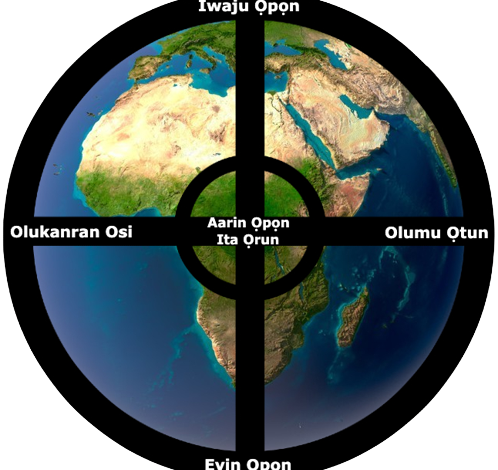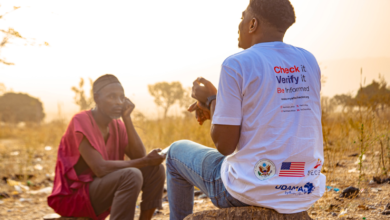African Traditional Religion: Perspective on Fighting Misinformation

BY- Habeeb Adisa
The fast dissemination of information in the digital age has aggravated the issue of misinformation. Societies are currently grappling with how to minimize the consequences of information malady. The African traditional religions have long developed moral and spiritual frameworks for truth-telling and openness.
There are lessons buried in African cosmologies—like those in the Ifá divination system that offer fundamental insights on the function of truth and the rejection of falsehoods. These traditions offer spiritual and cultural means of combating misinformation.
For example, the Yoruba cosmology, particularly through the Ifá corpus, truth (òtítọ́) is a key element of character (iwa). The Yoruba people believe that a person of truth embodies divine attributes and is seen as someone who lives in alignment with the cosmic order.
African traditional thought on truth is not merely a moral virtue but a fundamental principle that governs the balance of society, nature, and the spiritual realm. Lies and deception are seen as forces of disorder that disrupt harmony within both the community and the universe. Various African religious traditions emphasize the importance of living in truth because, without it, both personal integrity and communal well-being are compromised.
Ifá Corpus on Deception/ Misinformation
The Ifá divination system contains numerous verses ‘odu’ that show the danger of falsehoods and the value of truth.
One such verse is Odu Ogbe Rikusa, which speaks directly to the consequences of lying:
“Whoever speaks the truth, speaks what is just,
Whoever speaks lies, speaks misfortune.
Falsehood may run for a thousand years,
But truth will catch up with it in one day.”
— Ifá, Odu Ogbe Rikusa
Odu Iwori Meji also reinforces this concept:
“Truth is the pillar that sustains the Earth.
Lies are the axe that seeks to cut down that pillar.
But as the axe falls, so too does the liar.”
— Ifá, Odu Iwori Meji
This verse expresses that while lies and misinformation may spread and persist for a long time, truth has an inherent power that eventually brings deception to light. It reflects a fundamental belief in the eventual triumph of truth over falsehood, emphasizing that misinformation, no matter how widespread, cannot ultimately defeat reality.
Other African spiritual systems also respect truth, take for instance the Akan philosophy—from the Ashanti and Fante people of Ghana—truth (nokware) is a fundamental principle defining a person’s moral nature. The Akan put it as “truth is life” as only by living by it would people flourish, and that deception opens the door to anarchy and social collapse. For the Igbos, this also conforms with their saying, ‘‘ezi-okwu bu ndu: truth is life.’’
For African religious, traditions often use rituals and incantations to ward off negative forces, including lies and deception. These rituals serve as spiritual safeguards that protect communities from being overwhelmed by falsehoods. For instance, among the Yoruba, people might invoke Òrúnmìlà, the deity of wisdom and divination, to reveal the truth in situations of doubt or deceit. Incantations may include phrases like:
“Orunmila, unveil the truth,
For falsehood clouds the path,
Let truth shine, and deception flee.”
These spiritual practices act as communal tools for discerning truth, allowing the community to confront and dispel misinformation before it takes root. In modern societies, misinformation spreads rapidly through digital platforms, influencing public opinion, political decisions, and even personal relationships. However, African traditional religious frameworks offer timeless principles that can be applied to fight against the spread of misinformation in today’s digital age.
- Communal Responsibility for Truth: Truth-telling serves not just personally but also has social responsibilities in African societies. False information harms social cohesiveness, hence society has to combat misinformation. Communities—online as well as offline—must actively assist in identifying and dispelling false information in the current surroundings.
- Spiritual and Moral Integrity: African religious beliefs stress that since they are in line with the divine and the universe, a person must show spiritual and moral integrity. Especially anticipated to be represented by leaders and others in positions of authority. Integrity has to be appreciated ethically and culturally in the struggle against false information to transmit exactly what is accurate only by itself.
- The Long-Term Consequences of Lies: African religious systems advise that lying and dishonesty will finally have bad consequences. This conviction in the ultimate discovery of lies reminds us that misleading information cannot be maintained permanently even if it might seem strong in the near future. It exhorts nations to back long-term truth-seeking initiatives including fact-checking organizations and media literacy campaigns.
African traditional religions, through their veneration of truth and condemnation of lies, provide powerful ethical frameworks that are highly relevant in the battle against misinformation today. The ancient wisdom of Ifá, the communal ethics of ubuntu, amongst other morals combat deception and give a deep guidance for modern societies facing the looming consequences of misinformation.




